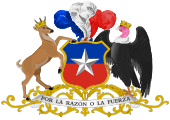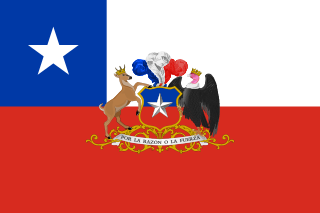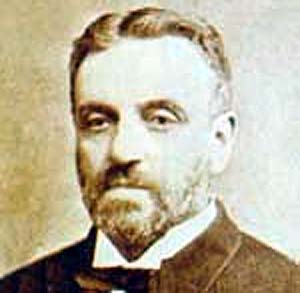| |||||||||||||
| |||||||||||||
| |||||||||||||
 |
|---|
Presidential elections were held in Chile on 18 October 1891. Carried out through a system of electors, they resulted in the election of Jorge Montt (the sole candidate) as President. [1]
| |||||||||||||
| |||||||||||||
| |||||||||||||
 |
|---|
Presidential elections were held in Chile on 18 October 1891. Carried out through a system of electors, they resulted in the election of Jorge Montt (the sole candidate) as President. [1]
| Candidate | Party | Votes | % | |
|---|---|---|---|---|
| Jorge Montt | Liberal–Radical–Conservative | 255 | 100.00 | |
| Total | 255 | 100.00 | ||
| Source: Chilean Elections Database | ||||

Chile's government is a representative democratic republic, whereby the President of Chile is both head of state and head of government, and of a formal multi-party system. Executive power is exercised by the president and by their cabinet. Legislative power is vested in both the government and the two chambers of the National Congress. The judiciary is independent of the executive and the legislature of Chile.

Federico Errázuriz Echaurren was a Chilean politician who served as the 12th president of Chile.

Jorge Montt Álvarez was a vice admiral in the Chilean Navy and president of Chile from 1891 to 1896.
This article gives an overview of liberal and radical parties in Chile. It is limited to liberal and radical parties with substantial support, mainly proved by having had a representation in parliament. The sign ⇒ means a reference to another party in that scheme. For inclusion in this scheme, parties do not necessarily need to have labeled themselves as a liberal party.

The Chilean Civil War of 1891 was a civil war in Chile fought between forces supporting Congress and forces supporting the President, José Manuel Balmaceda from 16 January 1891 to 18 September 1891. The war saw a confrontation between the Chilean Army and the Chilean Navy, siding with the president and the congress, respectively. This conflict ended with the defeat of the Chilean Army and the presidential forces, and with President Balmaceda committing suicide as a consequence of the defeat. In Chilean historiography the war marks the end of the Liberal Republic and the beginning of the Parliamentary Era.

The Chilean Navy is the naval warfare service branch of the Chilean Armed Forces. It is under the Ministry of National Defense. Its headquarters are at Edificio Armada de Chile, Valparaiso.

José Manuel Emiliano Balmaceda Fernández served as the 10th President of Chile from September 18, 1886, to August 29, 1891. Balmaceda was part of the Castilian-Basque aristocracy in Chile. While he was president, his political disagreements with the Chilean congress led to the 1891 Chilean Civil War, following which he shot and killed himself.
The Liberal Party was a Chilean political party created by a faction of pipiolos in 1849. After the conservative victory in the Chilean Civil War of 1829 the liberals became the principal opposition party to the Conservative Party. During the Liberal Party's early history one of its main goal was to create a new constitution to replace the Chilean Constitution of 1833. Rigged election helped to prevent the Liberal Party's presidential candidates to be elected until 1861, during that time elements of the liberal party made attempts to overthrow the government, these were the Revolution of 1851 and the Revolution of 1859. These failed insurrections led many liberals to emigrate, among them Benjamín Vicuña Mackenna. In 1863 a group of liberal split off to form the Radical Party which would hold power from 1938 to 1952. Originally an anticlericalist party that championed classical liberalism, the liberals later became a right-wing party.

The Radical Party was a Chilean political party. It was formed in 1863 in Copiapó by a split in the Liberal Party. Not coincidentally, it was formed shortly after the organization of the Grand Lodge of Chile, and it has maintained a close relationship with Chilean Freemasonry throughout its life. As such, it represented the anticlericalist position in Chilean politics, and was instrumental in producing the "theological reforms" in Chilean law in the early 1880s. These laws removed the cemeteries from the control of the Roman Catholic Church, established a civil registry of births and death in place of the previous recordkeeping of the church, and established a civil law of matrimony, which removed the determination of validity of marriages from the church. Prior to these laws, it was impossible for non-Catholics to contract marriage in Chile, and meant that any children they produced were illegitimate. Non-Catholics had also been barred from burial in Catholic cemeteries, which were virtually the only cemeteries in the country; instead, non-Catholics were buried in the beaches, and even on the Santa Lucia Hill in Santiago, which, in the 19th century, functioned as Santiago's dump.

The Parliamentary Era in Chile began in 1891, at the end of the Civil War, and spanned until 1925 and the establishment of the 1925 Constitution. Also called "pseudo-parliamentary" period or "Parliamentary Republic", this period was thus named because it established a quasi-parliamentary system based on the interpretation of the 1833 Constitution following the defeat of President José Manuel Balmaceda during the Civil War. As opposed to a "true parliamentary" system, the executive was not subject to the legislative power but checks and balances of executive over the legislature were weakened. The President remained the head of state but its powers and control of the government were reduced. The Parliamentary Republic lasted until the 1925 Constitution drafted by President Arturo Alessandri and his minister José Maza. The new Constitution created a presidential system, which lasted, with several modifications, until the 1973 coup d'état.
The Liberal Democratic Party, also called Balmacedists, was a liberal party in Chile. It was one of the main actors of the Chilean parliamentary system from 1891 to 1925.

The President of Chile, officially known as the President of the Republic of Chile, is the head of state and head of government of the Republic of Chile. The president is responsible for both government administration and state administration. Although its role and significance have changed over time, and its position and relations with other actors in the national political organization have also evolved, it remains one of the most prominent political offices in the country. It is also considered one of the key institutions that form the "Historic Constitution of Chile," and is crucial to the country's political stability.

The Revolutionary Junta of Iquique, was the political structure that was established by the Chilean Congress and Admiral Jorge Montt to challenge the power of Chilean President José Manuel Balmaceda after the navy insurrection that started the 1891 Chilean Civil War. The junta ruled the country until Admiral Jorge Montt assumed power as the new president after Balmaceda's defeat and suicide in September 1891.

Pedro Vicente Reyes Palazuelos, was a Chilean lawyer, journalist, political figure, and candidate during the 1896 presidential election.

The following is an alphabetical list of articles related to the Republic of Chile.
The following lists events that happened during 1886 in Chile.
The 1891 Chilean presidential election may refer to:
Indirect presidential elections were held in Chile on 25 July 1891. Claudio Vicuña Guerrero, a member of the Liberal Party, was elected president. However, he never took office and subsequently went into exile.